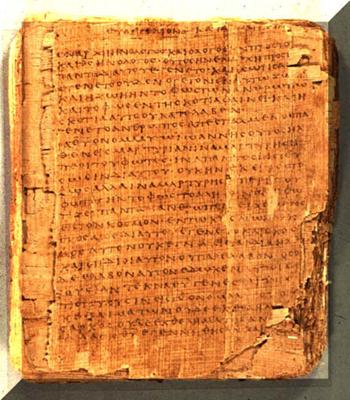Blue Letter Bible Greek Word Phileo What Does It Mean
What words could Paul have used if he intended to condemn homosexuality?


p66 Greek Manuscript
If Paul intended to condemn homosexuality, he could have used a word from the following list to make his point. Yet instead of using these words, Paul coined a new Greek word, arsenokoitai or arsenokoites, from the arsenokoit stem. Thanks for taking time to educate yourself by exploring the textual links.
Some people believe that Paul coined the Greek word arsenokoitai, from the words arsenos koiten, found in Lev 20:13 in the Septuagint, a Greek translation of the Old Testament, where the biblical, cultural, historical and religious context is temple prostitution.
There is not a shred of objective historical evidence to support the belief that anyone in the first century AD understood arsenokoitai to refer to male and female homosexuality in general or used arsenokoitai with that meaning.
If you disagree, please present factual evidence to support your disagreement. Thanks for remembering - your opinion is not factual evidence. Neither is your "strong" belief. Neither is your gut feeling on this issue. Neither is your hunch. Neither is the consensus of scholars who think differently.
When objective facts are honestly considered, not a shred of evidence exists to support the view that the arsenokoit stem means gay or lesbian.
Ancient Greek and Latin words
Paul could have used
- arrenomanes - meaning mad after men or boy crazy
- dihetaristriai - a synonym referencing lesbian sexuality, meaning essentially the same thing as hetairistriai, tribad, tribades, from: Love Between Women: Early Christian Responses to Female Homoeroticism, Brooton, Bernadette, p. 23.
- erastes - a sometimes older man who loves a sometimes younger male
- eromenos - a sometimes younger male who loves an older male
- euryproktoi – men who dress as women, also a vulgar reference to anal penetration
- frictrix - Latin word referring to a lewd woman and sometimes used to refer to a lesbian. Tertullian, 160-220 AD, translated tribas (a masculine woman) as frictrix.
- hetairistriai - women who are attracted to other women, used by Plato's character Aristophanes, in The Symposium. May also refer to hyper-masculine women, from Lucian's Dialogue of the Courtesans, cited by Brooten, p. 52.
- kinaidos – a word for effeminate, κίναιδος or kínaidoi (cinaedus in its Latinized form), a man "whose most salient feature was a supposedly feminine love of being sexually penetrated by other men." Winkler, John J., 1990, The Constraints of Desire: The Anthropology of Sex and Gender in Ancient Greece, New York: Routledge.
Although some scholars, like Dr. Robert Gagnon, understand kinaidoi to mean the passive partner in a male couple, Davidson argues that kinaidoi refers to a man insatiable and unrestrained in his sexual appetites instead of merely effeminate or passive. Davidson, J. 1997. Courtesans & Fishcakes: The Consuming Passions of Classical Athens, New York, p. 167-182.
- lakkoproktoi - a lewd and vulgar reference to anal penetration
- lesbiai - a synonym referencing lesbian sexuality, meaning essentially the same thing as dihetaristriai, hetairistriai, tribad, tribades, from: Love Between Women: Early Christian Responses to Female Homoeroticism, Brooton, Bernadette, p. 23.
- paiderasste – sexual behavior between males
- paiderastes or paiderastïs - παιδεραστής derived from the Greek word pais, παῖς a boy, meaning lover of boys
- paidomanes - a male mad for boys or boy crazy
- paidophthoros - a Greek word meaning corrupter of boys
- pathikos – the passive penetrated partner in a male couple
- tribades - an ancient Latin word indicating the active female partner of a lesbian pair, sometimes interpreted to mean a pseudo-male, referencing genital contact between women. Rashi defines it as "rubbing in a sexual manner."
- tribas - the active partner in a lesbian relationship, who takes the male role
If Paul had used one of these words in Romans 1:26-27 or 1 Corinthians 6:9 or 1 Timothy 1:10, we could be reasonably certain of his meaning. However, Paul did not use any of these words, suggesting he had some- thing else in mind, like rape, interspecies sex or shrine prostitution, when he coined his interesting new Greek word, arsenokoitai.
Paul intended to remind his readers of the real meaning of arsenokoitai, based on the way first century Jews understood Leviticus 20:13. Therefore modern readers need to remind themselves that in the first century, Jewish religious leaders understood arsenos-koiten as used in Leviticus 20:13, as condemning shrine prostitutes and the sex rituals which accompanied their worship of false gods.
There is not a shred of objective historical evidence that anyone in the first century AD understood arsenokoitai to refer to male and female homosexuality in general or used arsenokoitai with that meaning.
If you disagree, please present factual evidence to support your disagreement. Thanks for remembering - your opinion is not factual evidence. Neither is your "strong" belief. Neither is your gut feeling on this issue. Neither is your hunch. Neither is the consensus of scholars who think differently.
When objective facts are honestly considered, not a shred of evidence exists to support the view that the arsenokoit stem means gay or lesbian.
Return to Gay Christian FAQ
Return to
Gay Christian 101 Home Page
Blue Letter Bible Greek Word Phileo What Does It Mean
Source: https://www.gaychristian101.com/what-words-could-paul-have-used-if-he-intended-to-condemn-homosexuality.html